
A comic book, also called comicbook, comic magazine or simply comic, is a publication that consists of comics art in the form of sequential juxtaposed panels that represent individual scenes. Panels are often accompanied by descriptive prose and written narrative, usually, dialogue contained in word balloons emblematic of the comics art form.

Viz is a British adult comic magazine founded in 1979 by Chris Donald. It parodies British comics of the post-war period, notably The Beano and The Dandy, but with extensive profanity, toilet humour, black comedy, surreal humour and generally sexual or violent storylines. It also sends up tabloid newspapers, with mockeries of articles and letters pages. It features parody competitions and advertisements for overpriced 'limited edition' tat, as well as obsessions with half-forgotten kitsch celebrities from the 1960s to the 1980s, such as Shakin' Stevens and Rodney Bewes. Occasionally, it satirises current affairs and politicians, but it has no particular political standpoint.
Disney comics are comic books and comic strips featuring characters created by the Walt Disney Company, including Mickey Mouse, Donald Duck and Scrooge McDuck.

A British comic is a periodical published in the United Kingdom that contains comic strips. It is generally referred to as a comic or a comic magazine, and historically as a comic paper. As of 2014, the three longest-running comics of all time were all British.
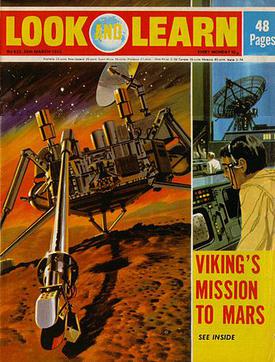
Look and Learn was a British weekly educational magazine for children published by Fleetway Publications Ltd from 1962 until 1982. It contained educational text articles that covered a wide variety of topics from volcanoes to the Loch Ness Monster; a long running science fiction comic strip, The Trigan Empire; adaptations of famous works of literature into comic-strip form, such as Lorna Doone; and serialized works of fiction such as The First Men in the Moon.
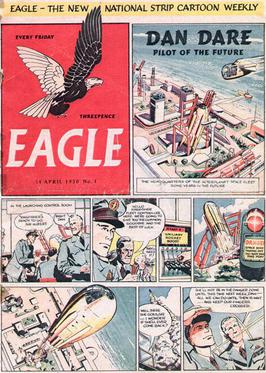
Eagle was a British children's comics periodical, first published from 1950 to 1969, and then in a relaunched format from 1982 to 1994. It was founded by Marcus Morris, an Anglican vicar from Lancashire. Morris edited a Southport parish magazine called The Anvil, but felt that the church was not communicating its message effectively. Simultaneously disillusioned with contemporary children's literature, he and Anvil artist Frank Hampson created a dummy comic based on Christian values. Morris proposed the idea to several Fleet Street publishers, with little success, until Hulton Press took it on.

Crisis was a British comic anthology published by Fleetway Publications from 17 September 1988 to October 1991, initially fortnightly and later monthly. Designed to appeal to older readers than other Fleetway titles in order to take advantage of a boom in interest in 'adult' comics, Crisis featured overtly political and complex stories; one issue was even produced in conjunction with Amnesty International.

Shogakukan Inc. is a Japanese publisher of dictionaries, literature, comics (manga), non-fiction, DVDs, and other media in Japan.
John Fardell is an English cartoonist, and author and illustrator of children's books.

Smut was a British adult comics magazine that was launched on 1 May 1989.
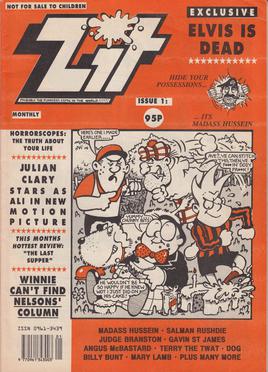
Zit was an adult British comic that was published by Humour Publications UK, beginning with a free sample issue in January 1991, and with issue 1 in February 1991, The final Issue, Issue 143 was published in May 2002
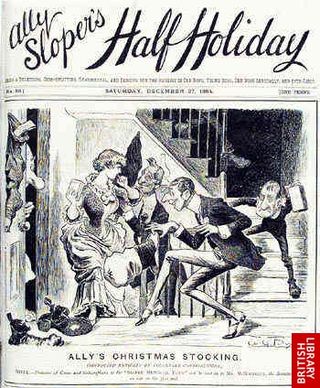
Ally Sloper's Half Holiday was a British comics magazine, first published on 3 May 1884. It is regarded to be the first comic strip magazine to feature a recurring character. Star Ally Sloper, a blustery, lazy schemer often found "sloping" through alleys to avoid his landlord and other creditors, had debuted in 1867 in the satirical magazine Judy – created by writer and fledgling artist Charles Henry Ross and inked and later fully illustrated by his French wife Émilie de Tessier under the pseudonym "Marie Duval".

Spit! was the name of a British adult comic that was published from 1994.
UT was a British adult comic that was published monthly in the mid-1990s.

Brain Damage was a British adult comic that was published monthly by Galaxy Publications and edited by Bill Hampton from 1989 to 1992.

Gas was a British adult comic that was published monthly by Galaxy Publications from 1989 to 1991.

Oink! was a British comic book magazine for children which was published from 3 May 1986 to 22 October 1988. It set out to be deliberately anarchic, reminiscent of Viz but for children. The creators also cited Mad magazine as a major influence.
Lew Stringer is a freelance comic artist and scriptwriter.

Kev F. Sutherland is a Scottish comedian, caricaturist, and comic strip creator. He has drawn for a variety of publications, including The Beano. He has produced several shows at the Edinburgh Festival Fringe, including The Sitcom Trials and The Scottish Falsetto Sock Puppet Theatre.
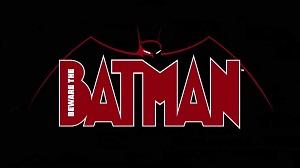
Beware the Batman is an American animated television series based on the DC Comics superhero Batman. Produced by Warner Bros. Animation and DC Entertainment, the series premiered in the United States on Cartoon Network on July 13, 2013 as part of the DC Nation programming block, replacing Batman: The Brave and the Bold.
















